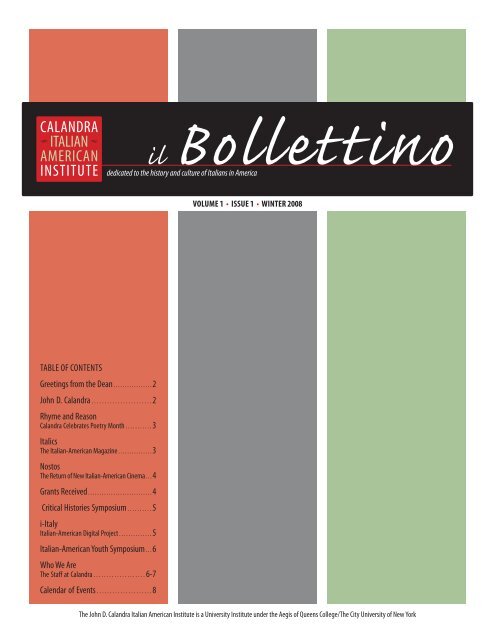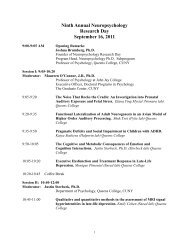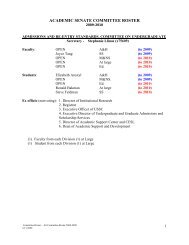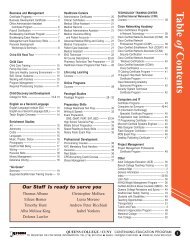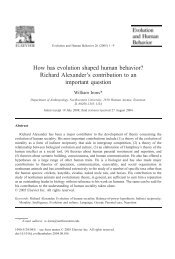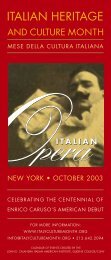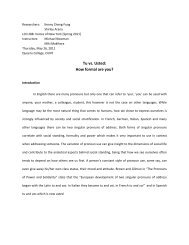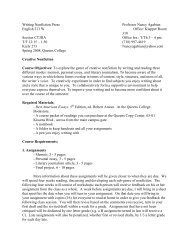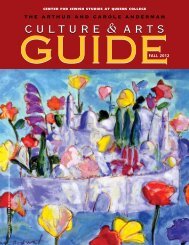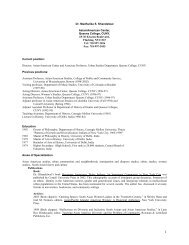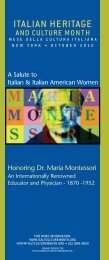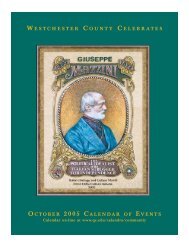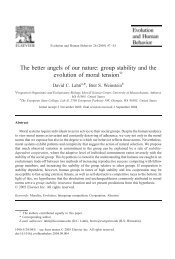CAlANDRA ITAlIAN AMeRICAN INsTITUTe - CUNY
CAlANDRA ITAlIAN AMeRICAN INsTITUTe - CUNY
CAlANDRA ITAlIAN AMeRICAN INsTITUTe - CUNY
You also want an ePaper? Increase the reach of your titles
YUMPU automatically turns print PDFs into web optimized ePapers that Google loves.
Calandra<br />
s Italian<br />
American<br />
Institute<br />
s<br />
il Bollettino<br />
dedicated to the history and culture of Italians in America<br />
Volume 1 • Issue 1 • Winter 2008<br />
Table of Contents<br />
Greetings from the Dean . . . . . . . . . . . . . . . . . 2<br />
John D. Calandra . . . . . . . . . . . . . . . . . . . . . . . 2<br />
Rhyme and Reason<br />
Calandra Celebrates Poetry Month . . . . . . . . . . . 3<br />
Italics<br />
The Italian-American Magazine . . . . . . . . . . . . . . . 3<br />
Nostos<br />
The Return of New Italian-American Cinema . . . 4<br />
Grants Received . . . . . . . . . . . . . . . . . . . . . . . . . . . . 4<br />
Critical Histories Symposium . . . . . . . . . . 5<br />
i-Italy<br />
Italian-American Digital Project . . . . . . . . . . . . . . 5<br />
Italian-American Youth Symposium . . . 6<br />
Who We Are<br />
The Staff at Calandra . . . . . . . . . . . . . . . . . . . . 6-7<br />
Calendar of Events . . . . . . . . . . . . . . . . . . . . . 8<br />
The John D. Calandra Italian American Institute is a University Institute under the Aegis of Queens College/The City University of New York
Greetings from the Dean<br />
Welcome to the inaugural issue of<br />
the Calandra Institute’s newsletter, il<br />
Bollettino! The past fifteen months have<br />
been challenging, and an overall gratifying<br />
experience. Together with the Calandra<br />
staff and various members of our Italian<br />
and Italian-American communities, we<br />
have been able to accomplish many things.<br />
The Italian-American community of<br />
the greater New York metropolitan area<br />
has proven to be most welcoming during<br />
this initial period. Some, in fact, also<br />
opened their coffers at this early stage.<br />
A long-time supporter of the Institute,<br />
Senator Serphin Maltese has procured yet<br />
another grant for the Institute’s Joseph<br />
Grosso in order to continue publication<br />
of Queens College’s il Giornalino, our<br />
student publication. In turn, we are<br />
delighted to be able to thank also the<br />
American Society of the Italian Legions of<br />
Merit and its president Justice Dominic<br />
Massaro. Equally generous at the outset<br />
was the National Italian American<br />
Foundation, which allowed the Calandra<br />
Institute to benefit from a previously<br />
awarded grant. All of this has enabled us<br />
to bring forth numerous events that help<br />
lay the foundation for a sustained objective<br />
of (1) studying further our culture in all<br />
of its numerous manifestations and (2) reexamining<br />
in a more rigorous manner the<br />
history of Italian Americans.<br />
Italian-American state legislators<br />
have also extended their warmest of<br />
welcomes, and we at the Institute are<br />
delighted to have worked with them this<br />
past June on their annual conference. We<br />
look forward to a future collaboration<br />
under the leadership of their president,<br />
Assemblyman William Magnarelli.<br />
The Institute has done much<br />
significant work over these past two-plus<br />
decades. To be sure, much still needs to<br />
be done, and our future activities will<br />
continue to explore the multifarious<br />
sectors of our extended community as<br />
we move forward. Some of our staff are<br />
stationed on <strong>CUNY</strong> campuses, while<br />
others work out of the Institute’s home in<br />
Manhattan, all contributing to our overall<br />
mission and goals.<br />
With regard to research and<br />
scholarship done by Institute staff and<br />
affiliated scholars, we will ensure that it<br />
appears in venues such as journals and<br />
books as well as being available in pdf<br />
format on our website. We have three<br />
projects in the works: one, a volume of<br />
collected socio-psychological studies<br />
conducted by Institute personnel and<br />
affiliate scholars, edited and with an<br />
introduction by our colleague Dr. Nancy<br />
Ziehler; the second, the English edition<br />
of a collection of essays from last June’s<br />
Pesaro Film Festival; the third, a collection<br />
of essays from the Fifth Italo-American<br />
Social Science Conference (a morning<br />
session was hosted at Calandra), edited by<br />
Dr. William Parrillo of William Patterson<br />
University. Finally, in the near future we<br />
look forward to the continuation of The<br />
Italian American Review. We will make an<br />
announcement in the spring with more<br />
specific information.<br />
Information on our other events of<br />
this past year are included in this issue of il<br />
Bollettino. Please do not hesitate to call on<br />
us if we can be of any assistance. Also, be<br />
sure to join our list-serve and mailing list.<br />
Our contact information is at the bottom<br />
of this page.<br />
Dulcis in fundo: All of what we have<br />
been able to accomplish could not be done<br />
without unyielding support from both<br />
Chancellor Matthew Goldstein’s Office<br />
of <strong>CUNY</strong> and President James Muysken’s<br />
Office of Queens College. They and their<br />
staff have cleared many a path throughout<br />
these first fifteen months. •<br />
Senator John D. Calandra served his local and state-wide community<br />
with distinction and compassion from 1965 until his death in 1986.<br />
Senator Calandra believed that all individuals, rich and poor, should have<br />
equal opportunity and access to higher education. He committed much<br />
of his life to insuring a quality public education for all.<br />
Never forgetting his ethnic heritage, Senator Calandra was a staunch<br />
advocate for the rights of Italian Americans, making sure they did not<br />
suffer the discrimination their ancestors did on a regular basis. Senator<br />
8 Calandra’s 1978 report, “A History of Italian-American Discrimination at<br />
<strong>CUNY</strong>,” was instrumental in securing <strong>CUNY</strong>’s declaration of “protected<br />
class” status for all Italian Americans within the <strong>CUNY</strong> system, which led to the founding<br />
of the Institute. In fact, as chairman of the Italian American Legislative Caucus, the Senator<br />
worked with elected representatives in the New York State Senate and Assembly to establish<br />
the Italian American Institute to Foster Higher Education in 1979.<br />
Because of the Senator’s years of service to the Institute’s birth and development, in 1987<br />
Governor Mario M. Cuomo signed a bill into law renaming the Institute in the Senator’s<br />
honor, thus preserving the memory of his many efforts as a champion for social justice.<br />
Italics: The Italian American TV Magazine<br />
Channel 75<br />
Last Wednesday of the month<br />
10 am, 3 pm, 8:30 pm<br />
Repeats<br />
Saturday 8 pm<br />
Sunday 10 am<br />
Contact the Institute to be included on the newsletter<br />
mailing list. Provide your email address to<br />
receive the newsletter via email or your<br />
mailing address to receive a printed copy.<br />
il Bollettino is published by the<br />
John D. Calandra Italian American Institute<br />
Queens College/<strong>CUNY</strong><br />
25 West 43rd Street, Suite 1700, New York, NY 10036<br />
Phone: 212-642-2094 Fax: 212-642-2030<br />
Email: calandra@qc.edu Website: www.cuny.qc.edu/calandra<br />
il Bollettino • Winter 2008 • John D. Calandra Italian American Institute • 25 West 43rd Street, New York, NY 10036 • 212-642-2094 • calandra@qc.edu • www.qc.cuny.edu/calandra<br />
2
Rhyme and Reason<br />
Calandra Celebrates Poetry Month<br />
In 1996, the Academy of American<br />
Poets established April as National Poetry<br />
Month. It is a time set apart to increase<br />
attention to the country’s lyrical heritage: to<br />
the art of poetry, the poets themselves, and,<br />
especially, to their poetry books, magazines,<br />
and journals. Over the years, it has become<br />
our nation’s largest literary celebration<br />
spilling over to other countries worldwide.<br />
On April 14, 2007, the Calandra<br />
Institute celebrated many of our Italian-<br />
American poets. More than thirty poets<br />
participated in this event, its only precursor<br />
being the decade-long reading series at the<br />
Cornelia Street Café sponsored by the Italian<br />
American Writers Association. While most<br />
of the poetry was in English, this first poetry<br />
fest also celebrated our local Italian-language<br />
poets who, while living in the United States,<br />
continue to express themselves in Italian.<br />
This bilingual aspect of the fest reminded us,<br />
of course, of our collective origins, harking<br />
back, at times, both to an Italy that no longer<br />
exists juxtaposed to one, instead, that is very<br />
much alive in our collective consciousness.<br />
Two individuals were recognized for<br />
their special contributions over the years,<br />
and both, ironically, are poets who, born<br />
and raised in Italy, have lived in this country<br />
for more than a half century each. Daniela<br />
Gioseffi introduced Alfredo de Palchi, an<br />
Italian-language poet living in the United<br />
States since the early 1950s. De Palchi is<br />
truly a modern-day “renaissance man”: he has<br />
consistenly worn the hats of poet, translator,<br />
editor, publisher, and cultural philanthropist.<br />
An author of numerous books of his own, for<br />
just about fifty years he has also published the<br />
prestigious literary journal Chelsea. In midcentury<br />
he was among those who introduced<br />
to the United States, through translations,<br />
the poetry of Eugenio Montale, Salvatore<br />
Quasimodo, and Lucio Piccolo. In the past<br />
two decades especially, he has enabled many<br />
poets and presses to bring to the fore the<br />
works of many United States and Italian poets<br />
through prizes, grants, and special editions.<br />
The bilingual aspect of the fest reminded<br />
us of our collective origins, harking<br />
back to an Italy that no longer exists<br />
juxtaposed to one that is very much alive<br />
in our collective consciousness.<br />
While each poet read for approximately<br />
ten minutes throughout the day, this marathon<br />
was accompanied in mid-afternoon by a<br />
combination of reading and lecture by Joseph<br />
Tusiani. Entitled “Perspectives in Prismatic<br />
Writing,” Tusiani spoke about his influences<br />
and favorite poets and then proceeded to<br />
read from his own work. A unique writer<br />
indeed, Tusiani writes in four different<br />
languages: Italian, his native Apulian dialect,<br />
English, and Latin. In addition to his poetry,<br />
Tusiani has also written a three-volume<br />
autobiography that details the challenges he<br />
faced during his initial trip to the US and the<br />
subsequent years as an Italian in America.<br />
Poet, critic, and novelist, Tusiani is Professor<br />
Emeritus of Italian at Lehman College, <strong>CUNY</strong>.<br />
The first poet read at 10:00 a.m.<br />
and the last line was uttered at 5:00 p.m.,<br />
reading from both their published poetry<br />
and new works in progress. They came<br />
from as far away as Vermont to the north<br />
and Philadelphia to the south, with the<br />
majority of those present from the greater<br />
New York tri-state area. In all, those present<br />
were treated to an array of different lyrical<br />
voices. Family, biculturalism, bilingualism,<br />
social roles and stereotypes, gender, sexuality,<br />
immigration, relationships, and, overall,<br />
the constant negotiation of much of these<br />
and other themes served as the various<br />
backdrops for the aesthetic creation of<br />
the poets present. They included Mary<br />
Jo Bona, Rosette Capotorto, Rosemary<br />
Cappello, Peter Carravetta, Michael Cirelli,<br />
Paola Corso, Peter Covino, VinniMarie<br />
D’Ambrosio, Rachel Guido deVries, Gil<br />
Fagiani, Maria Famà, Emily Ferrara, Diana<br />
Festa, Luigi Fontanella, Fred Gardaphé,<br />
Daniela Gioseffi, Edi Giunta, George Guida,<br />
Annie Lanzillotto, Julia Lisella, Maria Lisella,<br />
Irene Marchegiani, Michael Palma, Vittoria<br />
Repetto, AnnaLisa Saccà, Al Tacconelli,<br />
Angelo Verga, and Robert Viscusi.<br />
The day was met with great attention<br />
and excitement. We hope to present another<br />
poetry festival in 2008.<br />
•<br />
Italics<br />
The Italian-American Magazine<br />
With the assistance of RAI (Radiotelevsione<br />
Italiana, Italy’s television network)<br />
and <strong>CUNY</strong> TV, the Calandra Institute was<br />
able to produce a pilot in June 1986 for an<br />
Italian-American TV magazine show, Italics.<br />
Subsequent reviews and interest generated<br />
by Italics, from the Italian-American as well<br />
as the community-at-large, provided the<br />
impetus to continue production. Over the<br />
years, Italics has become the de facto cable<br />
television presence for Italian Americans.<br />
In 1991, Italics was designated an<br />
“Official Quincentenary Project” by the<br />
Christopher Columbus Quincentenary<br />
Jubilee Commission in Washington DC.<br />
In 1994-95, Italics began a long-time<br />
collaboration with the National Italian<br />
American Foundation (NIAF).<br />
Originally hosted and produced by cofounders<br />
Drs. Emelise Aleandri and Joseph<br />
Scelsa, Italics is currently staffed by Lucia<br />
Grillo, Assistant Producer/Correspondent,<br />
William D. Schempp, Producer/Director,<br />
and Anthony Julian Tamburri, Executive<br />
Producer/Host. Italics airs on <strong>CUNY</strong> TV,<br />
channel 75 and other New York City cable<br />
TV stations.<br />
Highlights of 2007 include: Dean<br />
Tamburri’s discussion of the award-winning<br />
new film Golden Door with its director<br />
Emanuele Crialese, and leading actor<br />
Vincenzo Amato; a conversation with<br />
Calandra staff members Dr. Vincenzo<br />
Milione and Dr. Joseph Sciorra on the<br />
Institute’s recent research and cultural<br />
activities; the launching of the web portal<br />
i-Italy; extensive coverage of the 32nd<br />
annual NIAF Gala; and a conversation with<br />
distinguished sociologist Dr. Richard Alba.<br />
In October 2007, <strong>CUNY</strong> TV allotted<br />
Italics four extra hours of air time for the<br />
celebration of Italian culture and heritage.<br />
On the first four Mondays, Italics aired<br />
the following programs: the 2007 New<br />
York Conference of Italian American State<br />
Legislators; Italian Heritage and Culture<br />
Month 2007 preview and interview with<br />
Angelo Gimondo, Founder and Chairman,<br />
and Cav. Joseph Sciame, President, of the<br />
Italian Heritage and Culture Committee<br />
of New York, Inc.; the 200th Birthday of<br />
Constantino Brumidi at the US Capitol;<br />
and the NIAF special symposium on the<br />
“Italian-American Vote.” In December,<br />
an additional hour featured many of the<br />
activities that took place during October’s<br />
Italian Heritage and Culture Month.<br />
This year Italics: The Italian American<br />
Magazine will celebrate its twentieth year of<br />
programming on <strong>CUNY</strong> TV.<br />
il Bollettino • Winter 2008 • John D. Calandra Italian American Institute • 25 West 43rd Street, New York, NY 10036 • 212-642-2094 • calandra@qc.edu • www.qc.cuny.edu/calandra<br />
3
Nostos<br />
The Return of New Italian-American Cinema<br />
It was a first-class ticket that brought back<br />
to the homeland the filmmakers and scholars<br />
who descended from Italian immigrants.<br />
They were warmly welcomed last June to the<br />
43rd Festival of New Cinema in Pesaro, Italy.<br />
The Festival can flaunt an important story:<br />
Pier Paolo Pasolini announced his theory on<br />
the Cinema of Poetry to this public a few<br />
decades ago. The newest generation of Italian<br />
Americans showcased its film production<br />
because—as the coordinator of the Festival,<br />
Giuliana Muscio, Professor at the University<br />
of Padua, stated—“American cinema has<br />
seen a turn-around: show business seems<br />
now mainly peopled by Italian Americans.”<br />
The organization of this Festival was also<br />
Italian-American, thanks to the successful<br />
collaboration between Festival director<br />
Giovanni Spagnoletti and coordinator<br />
Giuliana Muscio, and the Calandra Institute<br />
represented in Pesaro by Dean Anthony<br />
Tamburri and Associate Director for Academic<br />
and Cultural Programs Joseph Sciorra.<br />
Two days of the Festival were dedicated<br />
to an Italian-American conference that<br />
brought together important scholars from<br />
both sides of the ocean. The first day was<br />
dedicated to the writer John Fante, and the<br />
second to Italian-American cinema per se.<br />
Fante is a beloved author in Italy, less so in the<br />
United States, and he was quoted, analyzed,<br />
thrashed and defended by a cohort of Italian<br />
scholars: Martino Marazzi of the University<br />
of Milan, Franco La Polla of the University of<br />
Rome, Emanuele Pettener of Florida Atlantic<br />
University, Francesco Durante, author of<br />
the monumental anthology Italoamericana,<br />
and the popular writer Lidia Ravera. The<br />
documentary John Fante, Profile of a Writer, by<br />
Giovanna Di Lello, opened the discussion.<br />
We can be proud of the success of Italian-<br />
American cinema at its first grand Italian<br />
opening: Michael Corrente’s movie, Brooklyn<br />
Rules (2007), won the Prize of the Audience,<br />
an important recognition coming from the<br />
numerous public of Pesaro who crowded the<br />
piazza in the suggestive nights of shows al<br />
fresco. Corrente was present at the Festival with<br />
a second movie, Federal Hill (1994), entirely<br />
shot in black and white.<br />
Possibly with the exception of John<br />
Turturro, with his Mac (1992) and Romance<br />
and Cigarettes (2005), the majority of the<br />
filmmakers were relatively unknown to Italian<br />
audiences. Screenings included actor/director<br />
Steve Buscemi’s bleak Trees Lounge (1996),<br />
Raymond De Felitta’s sweet adventure<br />
of 1956 Staten Island, Two Family House<br />
(2000), and Tom Di Cillo’s meta-cinematic<br />
Living in Oblivion (1995). Vincent Gallo’s<br />
imaginative and autobiographical Buffalo<br />
’66 (1997) piqued the pubic’s interest, and<br />
Nick Stagliano’s barflys came to life in his The<br />
Florentine (1999). The young Kevin Jordan<br />
was present with Brooklyn Lobster (2006), the<br />
story of his family’s lobster farm. Two women<br />
were present with feature-length films and<br />
answered the audience’s questions after their<br />
shows: Nancy Savoca with her anti-romantic<br />
True Love (1989) and Mary Lou Bongiorno<br />
with her irreverent Little Kings (2006).<br />
What is an Italian-American film language?<br />
What are the components of its style, its<br />
recurrent visual motifs, the poetic of its<br />
images? And how does Italian-American<br />
cinema find its place among the other<br />
hyphenated American cinema? What<br />
are its specific and shared themes?<br />
The choice of documentaries was<br />
intriguing because most of the films were<br />
directed by women, who were like delicate<br />
hunters of pearls from private and public<br />
history. In addition to Giovanna Di Lello,<br />
Camilla Calamandrei showed her Prisoners<br />
in Paradise (2001), the surprising never-told<br />
story of Italian prisoners who were taken<br />
to the United States during World War II<br />
and decided to settle here. Susan Caperna<br />
Lloyd presented her The Baggage (2001), a<br />
most private and intense confession of her<br />
dysfunctional Italian-American family, an<br />
emotional touchstone for an appreciative<br />
audience. Twenty-five year old Veronica<br />
Diaferia captured the last painful days of<br />
the Italian-American store Ernesto Rossi &<br />
Co., filled to the brim with unbelievable<br />
merchandise and recently closed after a<br />
century of activity on Mulberry Street, in<br />
Closing Time (2006). With her husband<br />
Jerome, Mary Lou Bongiorno also presented<br />
two of their documentaries: Mother Tongue<br />
(1999), an interview with Italian-American<br />
mothers and sons, and the recent Revolutions<br />
’67 (2007) on the 1967 Newark riot that<br />
solicited the intervention of Italian-American<br />
policemen. Finally, Paul Reitano and<br />
Terrence Sacchi immortalized the Christmas<br />
decorations of an Italian-American Brooklyn<br />
neighborhood in Dyker Lights (2001).<br />
Two gems of film history were uncovered<br />
in Pesaro: Santa Lucia Luntana, a 1931<br />
tear-jerking movie by Harold Godsoe about<br />
an Italian-American family, and The Movie<br />
Actor by Bruno Vallety (1932), an exceptional<br />
and exhilarating apparition of the histrionic<br />
Eduardo Migliaccio, the famous Farfariello of<br />
Italian-American theater. Both films seem to<br />
have disappeared from regular movie circuits.<br />
Fortunately for aficionados at the Festival, the<br />
films enjoyed a momentary rebirth.<br />
The second day of the conference was<br />
dedicated to Italian-American cinema and<br />
saw a parade of experts and scholars, many<br />
of whom contributed essays to the festival’s<br />
volume, Quei bravi ragazzi: il cinema<br />
italoamericano contemporaneo (Marsilio, 2007).<br />
This Festival publication will soon be available<br />
in English, to be published by the Calandra<br />
Institute. The themes of the discussion were<br />
numerous and went from ethnic prejudice<br />
and sterotype to the representation of women,<br />
family and Italian-American masculinity, to<br />
the “flesh and soul” of this cinema, a rich<br />
symphony of voices that culminated in a<br />
round table chaired by Anthony Tamburri.<br />
At the conclusion, many hot topics were still<br />
burning and calling for a definite answer: what<br />
is an Italian-American film language? What are<br />
the components of its style, its recurrent visual<br />
motifs, the poetic of its images? And how does<br />
Italian-American cinema find its place among<br />
the other hyphenated American cinema? What<br />
are its specific and shared themes?<br />
This 43rd Festival was an important<br />
event. It finally made public in Italy the work<br />
of the grandchildren of immigrants who have<br />
now become producers of high culture, a<br />
culture that is completely other from today’s<br />
Italy. Such a meeting was necessary and<br />
long-awaited. As the title of Valerio Bisturi’s<br />
accompanying photography exhibit reminded<br />
us: it is time to go “Back to Little Italy.” •<br />
—Ilaria Serra, Florida Atlantic University<br />
Grants Received<br />
The National Italian American Foundation<br />
(www.niaf.org) awarded a $4,000 grant towards<br />
our “Documented Italians” film and video series,<br />
and a $4,500 grant towards our symposium<br />
“Critical Histories: Towards a New Perspective on<br />
Italian Americans.”<br />
The American Society for the Italian Legions of<br />
Merit awarded the Institute $4,000 to support our<br />
conferences and publications.<br />
The office of Serphin Maltese awarded a grant<br />
of $1,200 for publication of il Giornalino.<br />
il Bollettino • Winter 2008 • John D. Calandra Italian American Institute • 25 West 43rd Street, New York, NY 10036 • 212-642-2094 • calandra@qc.edu • www.qc.cuny.edu/calandra<br />
4
Critical Histories<br />
Towards a New Perspective on Italian Americans<br />
The emergence of Italian-American<br />
studies during the late 1960s and early 1970s<br />
was dominated to a large degree by social<br />
scientists and in particular historians. Over the<br />
last quarter of the twentieth century, literary<br />
and cultural studies scholars became an ever<br />
present intellectual force within the field. In<br />
recent years, a new generation of historians<br />
exploring the Italian-American subject has<br />
come to the fore. On September 22, 2007,<br />
the Calandra Institute sponsored, with<br />
funding from the National Italian American<br />
Foundation and the American Society of the<br />
Italian Legions of Merit, an all-day symposium<br />
entitled “Critical Histories: Towards a New<br />
Perspective on Italian Americans” featuring this<br />
stimulating new research.<br />
The morning panel began with Marcella<br />
Bencivenni of Hostos Community College,<br />
<strong>CUNY</strong>, who spoke about the cultural dimensions<br />
of Italian-American radicalism. She looked at<br />
the ways literature, poetry, theater, and visual<br />
arts fused with and sustained the political work<br />
of anarchists, socialists, and other leftist activists<br />
in the first half of the twentieth century.<br />
Bencivenni spoke of the need to move away<br />
from class as the central paradigm of radical<br />
politics and address the emotions and ethical<br />
views of industrial workers and radical leaders.<br />
In keeping with this reappraisal of<br />
the past, Peter Vellon of Queens College,<br />
<strong>CUNY</strong>, focused on New York City’s early<br />
Italian-language press, both mainstream and<br />
radical, to explore how race and civilization<br />
were constructed vis-à-vis people of color.<br />
Vellon’s analysis scrutinized the press not<br />
only for the information it contained but<br />
also as a form of cultural representation that<br />
engendered, negotiated, and reproduced a<br />
public dialogue on race.<br />
Liz Zanoni, a doctoral candidate at<br />
the University of Minnesota, also examined<br />
the Italian-language press for the “gendered<br />
i-Italy/Italian American Digital Project is a webbased,<br />
multimedia, open access portal that provides<br />
a means of conversation between Italians and Italian<br />
Americans worldwide. Developed by a group of journalists,<br />
academics, and “public intellectuals” determined to create<br />
an authoritative point of encounter, i-Italy offers our<br />
community the necessary instruments for the creation of<br />
a bilingual project on the web. It focuses on three major<br />
fields: information and discussion on current, social<br />
and cultural events, with “Magazine” and “Multimedia”<br />
representations of consumption” found<br />
within the pages of Il Progresso Italo-Americano<br />
during the 1920s and 1930s. Her presentation<br />
considered the ways fashionable clothing and<br />
food products positioned Italian-American<br />
women’s consumerism as neither completely<br />
American nor entirely Italian. Zanoni concluded<br />
her paper by comparing representations of<br />
Italian-American women to their counterparts<br />
in fascist Italy in an effort to explore transnational<br />
exchanges of gender ideologies, political<br />
culture, and visions of female consumption.<br />
New research about Italian-Americans<br />
and other members of the diaspora by<br />
scholars in Italy was the subject of keynote<br />
speaker Maddalena Tirabassi, director of<br />
the Fondazione Giovanni Agnelli’s Centro<br />
Altreitalie sulle Migrazioni Italiane in Turin.<br />
She began her presentation by summarizing<br />
how representations of Italian migrations have<br />
changed over the last decades, referencing<br />
recent creative works like Melania Mazzucco’s<br />
novel Vita (2003) and Emanuele Crialese’s<br />
film “Nuovomondo” (2006). The heart of<br />
Tirabassi’s paper was the work of young<br />
Italian scholars presented at the July 2007<br />
conference “Con gli occhi della globalizzazione:<br />
I nuovi studiosi e la ricerca sulle migrazioni<br />
italiane.” As Tirabassi explained, these junior<br />
scholars are part of a generation of “new<br />
mobiles,” academics who operate within global<br />
networks of intellectual pursuit and university<br />
employment who are, by default, sensitized to<br />
migratory issues.<br />
Jennifer Guglielmo of Smith College<br />
began the afternoon panel by discussing her<br />
research on Italian-American women and<br />
what she called the “politics of power.” Her<br />
talk challenged reigning historiographies<br />
that characterized Italian immigrant women<br />
as passive and subservient, dominated by<br />
excessively patriarchal males, and ultimately<br />
apolitical. She asked, “How does our sense<br />
of history change when we look at the world<br />
through women’s eyes?” Guglielmo’s response<br />
was the inclusion of third-world/women<br />
of color feminist historical methodologies<br />
i - I t a ly / I t a l i a n A m e r i c a n D i g i t a l P r o j e c t<br />
areas in which articles, movies, images and audio files are<br />
published; in-depth examination and cultural debate,<br />
with “Op-eds” and “Specials” areas in which opinions,<br />
comments, columns, analyses, and reviews are hosted;<br />
community building/social networking, with “Blog”<br />
and “Community” areas where readers can present their<br />
own experiences and opinions with personal pages,<br />
forums, discussion groups, and mailing lists.<br />
i-Italy addresses three major segments of a large<br />
potential audience: Americans of Italian descent,<br />
in analyzing power and the production of<br />
knowledge in Italian-American history.<br />
Nancy Carnevale of Montclair State<br />
University also challenged traditional<br />
immigration history, which has taken<br />
the forms of either community studies<br />
in relative isolation or the relationship<br />
between immigrants/ethnics and the larger<br />
American society. Carnevale’s paper called for<br />
greater attention to inter-ethnic relations in<br />
understanding how Italian Americans were<br />
constructed in specifically historical moments,<br />
cautioning against the essentialization of Italian<br />
Americans and other ethnic and racial groups.<br />
David Aliano of the College of Mount<br />
Saint Vincent discussed new approaches and<br />
recent comparative works in the study of<br />
Italian social, political, and cultural identities in<br />
Latin America. His presentation was mindful<br />
of situating this research within the context of<br />
the larger Italian diaspora and in relationship to<br />
Italian experiences in North America.<br />
Rounding out the day’s presentations<br />
was the event’s second keynote speaker<br />
Donna Gabaccia, director of the Immigration<br />
History Research Center at the University of<br />
Minnesota, who asked the provocative question<br />
“Do we still need Italian-American studies?”<br />
If, as Gabaccia suggested, research on Italian<br />
immigration has entered the mainstream in<br />
the past forty years, with a proliferation of<br />
endowed professorships, degree programs,<br />
and professional societies, has the scholarly<br />
field become irrelevant as it achieves success?<br />
Gabaccia raised further questions for young<br />
historians about the directions, possibilities,<br />
and responsibilities as they move forward with<br />
new perspectives and pursuits on the Italian-<br />
American subject.<br />
This exciting work by recent scholars of<br />
Italian-American history will make itself known<br />
increasingly as dissertations are rewritten for<br />
publication and essays are included in academic<br />
journals and anthologies. Such reexaminations<br />
of the past, especially in the form of additional<br />
conferences and symposiums, are imperative as<br />
we move into the future.<br />
•<br />
Italians living and working in the U.S., and Americans<br />
with no Italian ancestry, but who have an interest in<br />
Italy and Italian lifestyle and culture. It addresses three<br />
main topics: Italian America: social, political and cultural<br />
events related to the Italian/American community; Italy<br />
in the U.S.: Italian events in America, including artistic,<br />
cultural, and business events; Italy in Italy: Italian current<br />
events in politics, society, culture and lifestyle. The project<br />
is bilingual, with English as its main language. Visit www.<br />
i-italy.org to explore and contribute to this new web space.<br />
il Bollettino • Winter 2008 • John D. Calandra Italian American Institute • 25 West 43rd Street, New York, NY 10036 • 212-642-2094 • calandra@qc.edu • www.qc.cuny.edu/calandra<br />
5
Italian-American<br />
Youth Symposium<br />
On October 25, 2007, the Institutesponsored<br />
symposium “Recent Scholarship<br />
on Contemporary Italian-American<br />
Youth” was presented on the campus of<br />
Queens College. This symposium brought<br />
together seven scholars from diverse<br />
disciplines investigating various aspects of<br />
contemporary Italian-American youth. They<br />
looked at ways in which Italian-American<br />
adolescents and young adults negotiate the<br />
social and cultural landscapes that involve<br />
educational achievement, employment<br />
opportunities, and patterns of stress, as well<br />
as mass media, popular music, consumption,<br />
and cultural style.<br />
The program was greeted by Queens<br />
College President James L. Muyskens,<br />
and Anthony Julian Tamburri, Dean of<br />
the Calandra Institute. The first session<br />
addressed educational challenges and<br />
achievements and was chaired by Dr. Joseph<br />
Sciorra of the Calandra Institute. Dr. Donna<br />
Chirco of York College, <strong>CUNY</strong>, presented<br />
her paper “Transcendent Imagination and<br />
the Struggle for Educational Attainment<br />
Among Italian-American Women”; Dr.<br />
Vincenzo Milione of the Calandra Institute<br />
presented research findings on “Italian-<br />
American Educational Achievements in<br />
the Twenty-First Century and the Impact<br />
of Negative Stereotypes”; Pierre Tribaudi,<br />
also of the Calandra Institute, delivered<br />
his research paper “Stress Patterns in<br />
Adolescents: A Multicultural Perspective.”<br />
The session was commented on by discussant<br />
Dr. Dawn Esposito of St. John’s University.<br />
The second session focused on topics<br />
of identity and culture, chaired by Dr.<br />
Peter Vellon of Queens College. Dr. John<br />
Mitrano of Central Connecticut State<br />
University was unable to present his<br />
paper “Italian-American Identity Today<br />
(But Will There Be a Tomorrow?): The<br />
Fragility of Ethnic Identity in the Twenty-<br />
First Century” (we look forward to his<br />
visiting us at another time). Dr. Donald<br />
Tricarico of Queensborough Community<br />
College, <strong>CUNY</strong>, delivered his paper “Youth<br />
Culture, Ethnic Choices, and the Identity<br />
Politics of Guido.” Dr. Sciorra presented<br />
“The Ethnoscape of Hip Wop: Translocal<br />
Migrations of Italian-American Hip Hop.”<br />
This session was remarked on by discussant<br />
Dr. Peter Carravetta of Queens College. •<br />
W h o W e A r e — t h e S t a f f a t C a l a n d r a<br />
• Dr. Dominick Carielli serves as Director of the<br />
Center for Italian American Studies at Brooklyn College<br />
where he is responsible for directing the Center’s activities<br />
and developing counseling initiatives, and cultural and<br />
educational programs for students, faculty, and staff. He<br />
has been a Calandra Institute counselor since 1985. Dr.<br />
Carielli received his B.A. in psychology and his M.A.<br />
in College Counseling and Student Development from<br />
Hunter College. He earned his Ph.D. in counseling<br />
psychology from Fordham University and is a National<br />
Certified Counselor and Certified Clinical Mental Health<br />
Counselor. Dr. Carielli has served as President of the New<br />
York Mental Health Counselors Association, is a NYS<br />
Licensed Mental Health Counselor and is license eligible<br />
as a psychologist in NYS. He specializes in assessing and<br />
treating depression and anxiety, and has an extensive<br />
background in career development. He conducts<br />
individual and group sessions on deep breathing,<br />
progressive muscle relaxation, and guided imagery. Dr.<br />
Carielli has taught at the undergraduate and graduate<br />
level, authored book chapters and articles, and presented<br />
at numerous local, state, and national conferences.<br />
• Lisa Cicchetti is Editorial Assistant for the Institute’s<br />
publications. In this role she coordinates, edits, designs,<br />
and produces print and electronic materials such<br />
as brochures, programs, newsletters, and books of<br />
scholarship and literature. She brings to the Institute<br />
more than twenty years of experience as a graphic<br />
designer, project manager, and consultant for clients<br />
including arts organizations, educational institutions,<br />
and publishers. Ms. Cicchetti is active on issues of<br />
sustainability and permaculture, and was instrumental<br />
in bringing the environmental conference “Cry of the<br />
Earth” to the United Nations. She earned her B.A. degree<br />
in Social Science, with a minor in Women’s Studies, from<br />
SUNY Stony Brook.<br />
• Lucia Grillo is the Media and Performing Arts<br />
Assistant for Italics, the Institute’s monthly cable<br />
television program. She brings her background as an<br />
actress and award-winning filmmaker to her role as<br />
assistant producer, camerawoman, correspondent and<br />
editor. Ms. Grillo received her B.F.A. in Acting from<br />
New York University’s Tisch School of the Arts and<br />
minored in Italian Literature at NYU’s Casa Italiana<br />
Zerilli-Marimò, where she was an Assistant Fellow. She<br />
has worked in theatre, television, and cinema, with<br />
directors such as Spike Lee and others. She was Professor<br />
of Devised Performance at LAMDA Rome/University<br />
of Malta, lecturer on cinema, member of various juries,<br />
and honorary awards presenter at international film<br />
festivals. Under the banner of Calabrisella Films, she has<br />
written, produced, and directed commercials, television<br />
programs, music videos and short films, including the<br />
award winning A pena do pana (The Cost of Bread). Ms.<br />
Grillo is honored to be a part of Italics and looks forward<br />
to working with the Italian-American community.<br />
• Joseph Grosso is the Coordinator of the Perugia<br />
Summer Program in the Education Abroad Office at<br />
Queens College. In this role, he facilitates the study<br />
of Italian language and culture at the Università per<br />
Stranieri. Mr. Grosso is one of the original members<br />
of the Calandra Institute, joining the staff when it<br />
was initially established in 1980. He received his B.A.<br />
in Psychology from Brooklyn College and M.Ed. in<br />
Educational Psychology from Columbia University’s<br />
Teachers College. He publishes a yearly journal, il<br />
Giornalino, which features the writings of college and<br />
high school students studying Italian. Mr. Grosso also<br />
publishes a monthly newsletter entitled ciao–queens college<br />
which highlights activities and events of interest to the<br />
Queens College community. In addition, he is Assistant<br />
Coordinator of ARIA, the Italian American faculty and<br />
staff organization, and an Advisor to the Italian-American<br />
Club, a student organization at the college.<br />
• Rachel Hoyle is an Office Assistant whose<br />
responsibilities include assisting the Dean and the<br />
Assistant Director of Administration. She conducts<br />
administrative duties such as record-keeping, filing,<br />
office mailings, and word-processing and proofreading<br />
research documents. Ms. Hoyle’s previous employment<br />
was at the <strong>CUNY</strong> Graduate Center Registrar’s Office<br />
where she provided students with information regarding<br />
special programs. Ms. Hoyle brings her knowlwedge of<br />
student registration issues and office administration to her<br />
position as a support staff person for the Institute.<br />
• Dr. Maria La Russo is an Assistant for Specialized<br />
Counseling who provides counseling services at Hunter<br />
College, <strong>CUNY</strong> and Holy Cross High School, Bayside<br />
Queens. Dr. La Russo was a pioneering member of the<br />
Institute, joining the organization in 1980 during its<br />
early creation. She earned a B.A. in Education from Kean<br />
University and as an elementary school teacher became<br />
interested in issues of academic underachievement. Dr.<br />
La Russo earned her M.Ed. in Guidance and Counseling<br />
from Teachers College, Columbia University. Her interest<br />
in Italian ethnicity and family systems emerged during<br />
her work as a guidance counselor. She attended Farleigh<br />
Dickinson University, one of the few institutions in the<br />
1970s to offer course work in Italian culture and history.<br />
Her dissertation is entitled “Portraits of Third Generation<br />
Italian American Family Life.” Dr. La Russo has an<br />
extensive background in parent education and holds<br />
certifications as a school psychologist and family therapist.<br />
• Marianne DiPalermo-McCauley joined the staff<br />
of the Institute in 1986 as a teacher at the Columbus<br />
International High School. She serves as the Institute’s<br />
Curator-Archivist. Ms. Di Palermo-McCauley received<br />
her B.A. in Anthropology from SUNY Purchase and<br />
her M.S. in Counseling from Bank Street College<br />
of Education. In addition, she attended the <strong>CUNY</strong><br />
Graduate Center where she studied Environmental<br />
Psychology. Ms. Di Palermo-McCauley was the recipient<br />
of a graduate fellowship to study at the University<br />
of Trento, Italy in 1997, where she consulted with<br />
faculty in the departments of Sociology, Psychology,<br />
and Anthropology regarding American students and<br />
their academic integration into study abroad programs.<br />
She holds certifications from the National Board for<br />
Certified Counselors and The Society for Intercultural<br />
Education, Training and Research, and is a neurolinguistic<br />
programming practioner. She has presented her<br />
research findings at the Environmental Design Research<br />
Association Conference in Ankara, Turkey, <strong>CUNY</strong><br />
Graduate Center, and Youngstown State University.<br />
• Joan Migliori is the Coordinator of the Institute’s<br />
<strong>CUNY</strong>/Italy Exchange and Study Abroad Program, a<br />
<strong>CUNY</strong>-wide student exchange program in collaboration<br />
with several Italian universities. She received her B.A.<br />
in International Studies from the College of Staten<br />
Island, <strong>CUNY</strong>. She became an Assistant for Specialized<br />
Counseling at the Institute in 1985. In 1995, Ms.<br />
Migliori received the rank of Cavaliere of the Order of<br />
Merit of the Republic of Italy in recognition of her<br />
il Bollettino • Winter 2008 • John D. Calandra Italian American Institute • 25 West 43rd Street, New York, NY 10036 • 212-642-2094 • calandra@qc.edu • www.qc.cuny.edu/calandra<br />
6
W h o W e A r e — t h e S t a f f a t C a l a n d r a<br />
outstanding contribution to fostering relations between<br />
Italy and the United States. She also received the College<br />
of Staten Island’s “Dolphin Award” for bringing Italian<br />
cultural events to the college and community. Cavaliere<br />
Migliori currently serves on the Boards of Directors for<br />
the Italian Heritage and Culture Month Committee,<br />
NIAF of Greater New York, and the Associazione<br />
Internazionale Magna Grecia. Cavaliere Migliori is the<br />
daughter of Maria Luisa Marchi and New York State<br />
Senator John J. Marchi. Her two daughters, Stefania<br />
Barsuglia and Francesca Dell’ Aversano, and her grandson<br />
Giuseppe, live in Lucca, Italy.<br />
• Dr. Vincenzo Milione is the Director of<br />
Demographic Studies. Dr. Milione is responsible for<br />
social science research on Italian Americans, as well as<br />
conducting institutional research on <strong>CUNY</strong> faculty,<br />
administrative staff, and students for civil rights and<br />
affirmative action purposes. His research has included:<br />
the educational and occupational achievement of Italian<br />
Americans; Italian language studies at the elementary<br />
and secondary levels; high school non-completion rates;<br />
negative media portrayals of ethnic populations; and<br />
Italy/U.S. student exchange programs. Dr. Milione<br />
is a technical civil rights expert designated by Federal<br />
Judge Constance Baker Motley for affirmative action.<br />
Dr. Milione received his Ph.D. from SUNY Buffalo<br />
in Civil Engineering, specializing in socio-engineering<br />
systems. He also earned his B.S. in Physics and M.S. in<br />
Earth and Space Sciences from SUNY Stony Brook. Dr.<br />
Milione was conferred Honorary Doctor of Philosophy<br />
in Education by the Consejo Iberoamericano of Latin<br />
American Universities, and Doctor Honoris Causa by<br />
both Universidad Nacional Hermilio Valdizan and La<br />
Universidad Nacional de Tumbes, in Peru.<br />
• Rosaria Musco is the Assistant Director of<br />
Administration, responsible for oversight of the day-today<br />
administrative tasks and supervision of clerical staff<br />
at the Institute. Ms. Musco serves as a resource to local,<br />
regional, and private sector agencies regarding the array<br />
of programs and services at the Institute. She also edits<br />
and disseminates the online “New York’s Italian American<br />
Community Calendar” of events. Ms. Musco earned her<br />
B.A. degree in Liberal Arts from Queens College prior to<br />
joining the Calandra staff in 1997.<br />
• Olga Pappas is a College Assistant responsible for<br />
general reception duties. Ms. Pappas also assists with<br />
special requests in relation to the implementation of<br />
seminars, Italian language classes, and Institute programs,<br />
and is currently helping with research exploring the<br />
availability of microfilm archives of Italian and Italian-<br />
American newspapers.<br />
• Itala Pelizzoli completed her B.A. and M.A. degrees<br />
magna cum laude in Statistics from Baruch College,<br />
<strong>CUNY</strong>. She has been employed at the Institute since<br />
1996 and presently holds the title of Coordinator of<br />
Research and Demographics. In this role she works<br />
under the aegis of the Director of Demographics<br />
assisting in analyses of demographic trends based on<br />
census data including education attainment of Italian<br />
American youth, diaspora of Italians in the Americas, and<br />
utilization analysis of Italian Americans at <strong>CUNY</strong>. Ms.<br />
Pelizzoli also serves as a valuable resource to colleagues<br />
with methodological and statistical questions. Since<br />
the birth of her daughter Chiara in 1999, she works<br />
part-time at the Institute, and has a new addition to her<br />
family, her son Antonio born in 2004.<br />
• Carmine Pizzirusso earned his B.E. in Electrical<br />
Engineering from City College, <strong>CUNY</strong>. He was elected<br />
to student government as representative of the School<br />
of Engineering and has served in student organizations<br />
from treasurer to president. He was cofounder of the<br />
non-profit Friends of Lebanon Organization and served<br />
as the first Vice President. Mr. Pizzirusso has worked<br />
with many departments in the City University of<br />
New York as manager of the Central Office computer<br />
service department. He has also been a manager of<br />
information and technical services outside the university.<br />
Mr. Pizzirusso has vast experience and knowledge of<br />
operating systems and computer software. He serves as<br />
the Institute’s Research and Technical Coordinator.<br />
• Marianna Prestigiacomo is the Assistant to Dean<br />
Tamburri. She is responsible for providing technical and<br />
administrative support as well as maintaining confidential<br />
correspondence, editing and proofreading special reports,<br />
and maintaining database programs. Ms. Prestigiacomo is<br />
responsible for the data entry, proofreading and editing of<br />
the Calandra Institute’s online “Community Calendar of<br />
Events,” a bi-weekly email newsletter which promotes and<br />
publicizes community events. She also collates the events<br />
for inclusion in the annual Italian Heritage and Culture<br />
Month booklet and catalogues the Institute’s Italian and<br />
Italian-American periodicals and press clippings.<br />
• William “Bill” D. Schempp is the Producer and<br />
Director of Italics: The Italian American Magazine, the<br />
Institute’s cable television program. He has served in<br />
these roles for both the Institute and <strong>CUNY</strong> TV since<br />
the program’s inaugural episode in 1987. Along with<br />
Italics, Mr. Schempp currently has documentary projects<br />
in production, including Ralph Fasanella’s America,<br />
Vito Marcantonio, Radical Congressman, and A Silent<br />
Revolution, Craft Beer Culture in America. Mr. Schempp<br />
earned his M.F.A. Degree in Television Production from<br />
Brooklyn College, <strong>CUNY</strong> in 1986. His master’s thesis<br />
work, “A Well Founded Fear . . . Discussions on the<br />
Sanctuary Movement,” was included in two episodes<br />
of Paper Tiger Television’s A Deep Dish of Central<br />
America. Among his personal pursuits are music, craft<br />
beer/brewing, New Orleans culture, the soccer team AS<br />
Roma, and travel.<br />
• Dr. Joseph Sciorra is the Associate Director of<br />
Academic and Cultural Programs. He conducts social<br />
science research and organizes the Institute’s “Philip V.<br />
Cannistraro Seminar Series in Italian American Studies,”<br />
the “Writers Read” series, and the “Documented Italians”<br />
film series. Dr. Sciorra curated the Institute’s exhibitions<br />
“Sacred Emblems, Community Signs: Historic Flags and<br />
Religious Banners from Italian Williamsburg, Brooklyn”<br />
and “‘Evviva La Madonna Nera!’: Italian-American<br />
Devotion to the Black Madonna.” He successfully<br />
nominated the Our Lady of Mt. Carmel Grotto on<br />
Staten Island and the Lisanti Chapel in the Bronx to<br />
the National and New York State Registers of Historical<br />
Places. Dr. Sciorra received his Ph.D. in 1996 from<br />
the University of Pennsylvania. As a folklorist he has<br />
published extensively on religious practices and vernacular<br />
spaces in New York City. He co-edited a bilingual edition<br />
of verse by the Sicilian-American poet Vincenzo Ancona,<br />
Malidittu la lingua/Damned Language, and is the author<br />
of R.I.P.: Memorial Wall Art, a collection of photographs<br />
documenting memorial graffiti. Dr. Sciorra maintains<br />
a website about Italian hip hop and Italian-American<br />
identity at www.italianrap.com.<br />
• Dr. Anthony Julian Tamburri, Dean of the Calandra<br />
Institute, is Professor of Italian and Italian/American<br />
Studies. His publications on Italian Americana include:<br />
To Hyphenate or not to Hyphenate: the Italian/American<br />
Writer (1991); A Semiotic of Ethnicity: In (Re)cognition of<br />
the Italian/American Writer (1998); Italian/American Short<br />
Films & Videos (2002); and the co-edited collections,<br />
From The Margin: Writings in Italian Americana (1991;<br />
2000) and Scene italoamericane: la rappresentazione degli<br />
Italiani d’America (2002). With Paolo A. Giordano<br />
and Fred L. Gardaphé, he is co-founder of Bordighera<br />
Press, publisher of Voices in Italian Americana, Italiana,<br />
and VIA Folios, Crossings, and The Bordighera Poetry<br />
Prize. Dr. Tamburri is past president of the American<br />
Italian Historical Association, and past vice-president<br />
of the American Association of Teachers of Italian, now<br />
president for 2008-2009.<br />
• Phyllis Tesoriero is an Office Assistant whose<br />
primary responsibility is to assist the Director of<br />
Demographic Studies in the maintenance of the<br />
scholarship database. She is also responsible for<br />
administrative duties for demographics and research<br />
projects, general correspondence, and office mailings. Ms.<br />
Tesoriero brings her experience in office administration<br />
and customer service in the insurance industry to her<br />
position as a support staff person for the Institute.<br />
• Pierre Tribaudi is an Assistant for Specialized<br />
Counseling who provides personal, academic, and career<br />
counseling to students enrolled in the Center for Worker<br />
Education at Queens College and to students in two<br />
Brooklyn high schools. Mr. Tribaudi has been a counselor<br />
with the Institute since 1986, offering psychoeducational<br />
services to several <strong>CUNY</strong> campuses and high schools. He<br />
graduated from Long Island University with a B.A. in<br />
Psychology and Fordham University with a M.S.W. Mr.<br />
Tribaudi holds a license as a Clinical Social Worker, and<br />
maintains a part-time private psychotherapy practice with<br />
special interests in stress management and spirituality. His<br />
research interests include exploring stress patterns from a<br />
multicultural perspective.<br />
• Dr. Nancy Ziehler is a psychological counselor at<br />
Baruch College where she provides individual, group,<br />
and couples counseling to students. She also serves as<br />
advisor to the Italian American club on campus and<br />
delivers outreach services to high school students on<br />
Staten Island. Dr. Ziehler joined the Institute’s outreach<br />
counseling staff in 1985. She served as Counseling<br />
Coordinator from 1987 to 1995 and was then promoted<br />
to Associate Director of Counseling. In that capacity, she<br />
oversaw the Institute’s counseling and mentor programs,<br />
conducted student research, implemented programs, and<br />
presented papers at local, state and national counseling<br />
meetings. Dr. Ziehler received an M.S. in School and<br />
Community Counseling from the College of Staten<br />
Island and a Ph.D. in Counseling Psychology from<br />
New York University. She is a licensed mental health<br />
counselor in New York and New Jersey and is license<br />
eligible as a psychologist in New York State. Dr. Ziehler is<br />
a Nationally Certified Counselor and a Certified Clinical<br />
Mental Health Counselor, as well as adjunct professor of<br />
counselor education at NYU and Kean University. •<br />
il Bollettino • Winter 2008 • John D. Calandra Italian American Institute • 25 West 43rd Street, New York, NY 10036 • 212-642-2094 • calandra@qc.edu • www.qc.cuny.edu/calandra<br />
7
Calandra<br />
s Italian<br />
American<br />
Institute<br />
s<br />
John D. Calandra<br />
Italian American Institute<br />
Queens College <strong>CUNY</strong><br />
25 West 43rd Street, 17th floor<br />
New York, NY 10036<br />
Philip V. Cannistraro<br />
Seminar Series<br />
Thursday, February 21, 2008 at 6 p.m.<br />
“‘Il Fuoco di Minonga’: The 1907 Mine<br />
Disaster and the Making of Transnational<br />
Identity in West Virginia”<br />
Joan Saverino, Historical Society of Pennsylvania<br />
Tuesday, March 25, 2008 at 6 p.m.<br />
“Gramsci, Migration, and the<br />
Representation of Women at Work”<br />
Laura Ruberto, Berkeley City College<br />
Tuesday, April 8, 2008 at 6 p.m.<br />
“The American Myth Through Architecture:<br />
Modernism and Anti-Modernism”<br />
Giulia Guarnieri, Bronx Community College, <strong>CUNY</strong><br />
Thursday, May 8, 2008 at 6 p.m.<br />
“Italian in Florida: Shifting Identities in<br />
the Wake of Assimilation”<br />
Denise Scannell, NYC College of Technology, <strong>CUNY</strong><br />
} Seminars take place at:<br />
Calandra Italian American Institute<br />
25 West 43rd Street, 17th floor, Manhattan<br />
__________________________<br />
All events are free and open to the public.<br />
Pre-registration required/Info: 212.642.2094.<br />
Photo ID requested by building concierge.<br />
Writers Read Series<br />
Wednesday, February 27, 2008 at 6 p.m.<br />
Anne Marie Macari reads from<br />
Gloryland<br />
Wednesday, March 12, 2008 at 6 p.m.<br />
Emanuel di Pasquale reads from<br />
Writing Anew: New and Selected Poems<br />
Thursday, April 17, 2008 at 6 p.m.<br />
Danielle Trussoni reads from<br />
Falling Through the Earth: A Memoir<br />
Thursday, May 1, 2008 at 6 p.m.<br />
Richard Vetere reads from<br />
Machiavelli and Caravaggio<br />
} Readings take place at:<br />
Calandra Italian American Institute<br />
25 West 43rd Street, 17th floor, Manhattan<br />
__________________________<br />
All events are free and open to the public.<br />
Pre-registration required/Info: 212.642.2094.<br />
Photo ID requested by building concierge.<br />
C a l e n d a r o f E v e n t s<br />
Documented Italians<br />
Film Series<br />
Wednesday, February 6, 2008 at 6 p.m.<br />
“Nine Good Teeth” (2003), 80 min.<br />
Alex Halpern, director<br />
Wednesday, March 5, 2008 at 6 p.m.<br />
“Watch the Pallino” (2007), 42 min.<br />
Stephanie Foerster, director<br />
Tuesday, April 15, 2008 at 6 p.m.<br />
“Louis Prima: The Wildest!” (2000), 82 min.<br />
Don McGlynn, director<br />
Tuesday, May 20, 2008 at 6 p.m.<br />
“My Brother, My Sister, Sold for a Fistful<br />
of Lire,” (1998), 90 min.<br />
Basile Sallustio, director<br />
} Films screened at:<br />
Graduate School of Journalism<br />
230 West 41st Street, Room 308, Manhattan<br />
___________________________<br />
All events are free and open to the public.<br />
Pre-registration required/Info: 212.642.2094.<br />
Photo ID requested by building concierge.<br />
Upcoming<br />
Calandra Institute events:<br />
Tuesday, February 26, 2008<br />
Symposium, “Pensare Auschwitz”<br />
in collaboration with the Primo Levi Center<br />
Book Presentations:<br />
April 2, 2008 at 6 p.m.<br />
Mario Mignone, Italy Today: Facing the<br />
Changes of the New Millennium (2008)<br />
May 5, 2008 at 6 p.m.<br />
Elise Magistro, translator of Maria<br />
Messina’s Behind Closed Doors: Her Father’s<br />
House and Other Stories of Sicily (2007)<br />
Annual Conferences:<br />
April 24-26, 2008: “Italians in America”<br />
Spring 2009: “The Land of Our Return”<br />
Other events:<br />
Wednesday, February 13, 2008<br />
Homage to Mario Fratti<br />
Hunter College, Manhattan, NY<br />
For more info: 212-772-5093<br />
November 6-8, 2008<br />
AIHA Annual Conference, New Haven, CT<br />
For more info: www.aihaweb.org


